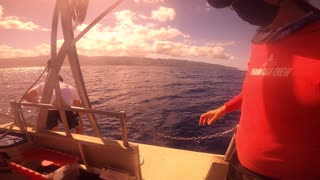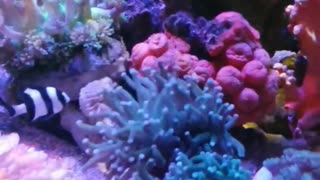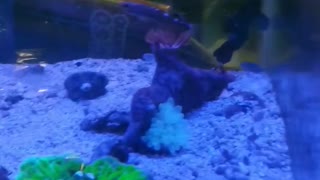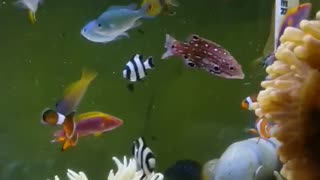Two Grey Sharks Diving Around Some Coral Reef
Looking at the statistics they mostly occur in the Southern parts of Australia like New South Wales and Western Australia.
According to finder.com.au with Research provided by Global Shark Attack File the data shows there have been 42 unprovoked fatal shark attacks in Australia since 1990, and although most recorded attacks have occurred in New South Wales, most fatalities transpired in Western Australia.
To give you a statistic there are over two million visitors to the Great Barrier Reef in Queensland each year! Tourism numbers are also growing.
Scientists are not 100% sure, but a little common sense suggests large dangerous sharks like the Great White Shark are attracted to the Southern Parts and Western parts of Australia for food.
Large seal or penguin colonies offer the perfect hunting grounds for Great White Sharks. Colder water temperatures and large Tuna or fish schools that swim close to shore, also attract Great White Sharks. These food sources bring the sharks in closer to land where they can interact with humans.
You can also find grey whaler reefs sharks, leopard sharks, epaulette sharks and wobbegong sharks a shabby door matt looking shark. These sharks are typically harmless to humans unless you specifically provoke them, for example, try to feed them, grab hold of them and spearfish when they are around.
In general, snorkeling and scuba diving on the Great Barrier Reef you will have no problem at all with these reef-dwelling sharks. They can, in fact, be a highlight of any snorkeling or scuba diving trip, often being the hot topic of conversation if you manage to spot one.
There are a couple of other sharks that inhabit the warmer waters of the Great Barrier Reef that can potentially be more of a threat to humans but are not commonly encountered.
These are the Tiger Shark, a larger grey shark with tiger-like markings on the side of its body. These guys are generally scavengers and very rarely encountered by snorkelers and divers on the Great Barrier Reef.
Oceanic White Tips, these guys are not generally found on the Great Barrier Reef they tend to hang out in the deeper waters of the Coral Sea. They appear to be roaming foragers with rare sightings on the Great Barrier Reef.
Bronze Whalers, a fast-moving shark, generally smaller than the Tiger or Oceanic White tip. These guys are known to be very inquisitive and have caused problems with spearfisherman in the past.
Bull Sharks, these guys tend to be scavengers and opportunists. Humans have encountered problems with these sharks in the mainland estuaries, and boating harbors where the visibility in the water is very low. Also early morning or late afternoon sunset these sharks tend to be more active.
There have only been a handful of recorded incidences of shark attacks on the Great Barrier Reef. In general, they are mostly human invoked incidences.
The common practice of Free Dive spearfishing is a fun way for sports spearfisherman to catch lovely eating reef fish. The process of spearing a fish on the reef let’s blood into the water from the speared fish. If there are any small sharks in the area they will pick up on this straight away and come in to investigate further.
There have been cases where small reef sharks have tried to bite the dead fish on the end of the spear, but somehow also give the human spearfisherman a bite in the process.
In general, just relax, enjoy the moment. It is most likely you might see a white tip or black tip reef shark. These guys will go about there day foraging for food in and out of the reefs. They are usually much smaller than yourself and are frightened away very easy. If you have a camera, take a picture, arm yourself with proof to show your fellow snorkelers and dives when you get back on the boat.
The short answer is, it is highly unlikely. The statistic you will have a car crash or be injured by public transport is much higher then the chance of being bitten by a shark snorkeling or scuba diving on the Great Barrier Reef.
-
 2:08
2:08
Sunsets and Scuba diving
3 years agodiving with sharks
651 -
 0:57
0:57
Omin
2 years agoCoral reef Aquarium (3)
1411 -
 0:36
0:36
Omin
2 years agoCoral reef aquarium (2)
100 -
 0:41
0:41
Omin
2 years agoCoral reef Aquarium (1)
103 -
 2:18
2:18
Beetrucker74
2 years agoJust some bird running around.
21 -
 41:56
41:56
Kimberly Guilfoyle
10 hours agoFrom the Courtroom to Campus, Left-Wing Corruption Spirals Out of Control, Live with Kash Patel & Eyal Yakoby | Ep. 123
48.6K56 -
 2:06:15
2:06:15
The Ramsey Show
14 hours agoThe Ramsey Show (May 6, 2024)
24.9K1 -
 1:30:31
1:30:31
Redacted News
8 hours agoHere we go! Putin WARNS of nuclear test launches, NATO readies for war | Redacted w Clayton Morris
117K271 -
 1:58:09
1:58:09
Revenge of the Cis
7 hours agoEpisode 1340: Stress Eating
46.9K15 -
 1:02:54
1:02:54
In The Litter Box w/ Jewels & Catturd
1 day agoArrest Jack Smith | In the Litter Box w/ Jewels & Catturd - Ep. 561 - 5/6/2024
71.5K60